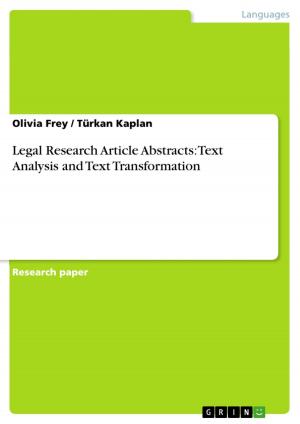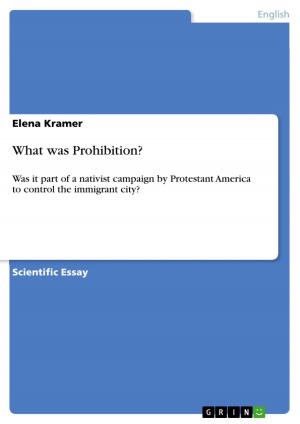Sir Francis Drake and the Ethnocentric Behaviour
Nonfiction, Reference & Language, Study Aids, ESL, Foreign Languages| Author: | Florian Schwarze | ISBN: | 9783640753086 |
| Publisher: | GRIN Publishing | Publication: | November 16, 2010 |
| Imprint: | GRIN Publishing | Language: | English |
| Author: | Florian Schwarze |
| ISBN: | 9783640753086 |
| Publisher: | GRIN Publishing |
| Publication: | November 16, 2010 |
| Imprint: | GRIN Publishing |
| Language: | English |
Seminar paper from the year 2010 in the subject English - Applied Geography, grade: 2,3, University of Koblenz-Landau (Anglistik), language: English, abstract: England became powerful, when Elizabeth I came to the throne in 1558. During her term England became one of the most powerful empires in the world. The first colonies were founded and the English troops conquered the Spanish Armada. A man called Francis Drake was the first English person, who circumnavigated the world. From 'Small' to 'Big' that was always the motto he lived and finally became famous with. His motto describes his life, a life which began in modest living conditions and finally reached the highest social classes (Damm 25). The Spanish feared and admired Francis Drake at the same time. This was due to his great courage and his unpredictability. They called him 'El Dragon - The Dragon'. He was hated by many Spaniards, but the King of Spain (Philip I.) hated him the most. He even announced to pay 20.000 ducats, on Drake's head (Wood 73). This was a great honour for Sir Francis Drake. What was it, that made him so dangerous for the Spanish King, and how did the Queen of England appreciated his doing? In which connection did he stand to Elizabeth I.? Who was this man and what influence did he have in the British Empire and on the British throne? In this work I will try to find answers to all these questions, but also find out more about his occurrence and behaviour, when he landed on unsettled land. I will try to compare his occurrence and behaviour, to the 'Ethnocentric' behaviour. Even though the coinage of the term 'Ethnocentrism' itself was first introduced in 1906, 'ethnocentric' behaviour can certainly be found centuries before that. When the European settlers began to colonize the 'new world', the land was simply taken from the native population. For the Europeans the Natives were outsiders with no rights. In most cases the explorers showed typical ethnocentric behaviour. How Sir Francis Drake treated the native population is one of the focuses of this paper. Did he show the same ethnocentric behaviour like most of the others did or was he friendly and nice to the native population? How did he get in contact with them to communicate? I will give a closer explanation to the term 'Ethnocentrism' and want it stands for, before I analyse the way Drake treated to native people, when he landed in the 'New World' (America). Her for I will analyse the narratives by Hakluyt about Sir Francis Drake's landing in the new world, which was somewhere in the vicinity of what is now San Francisco (The Norton Anthology of English Literature 894 ff).
Seminar paper from the year 2010 in the subject English - Applied Geography, grade: 2,3, University of Koblenz-Landau (Anglistik), language: English, abstract: England became powerful, when Elizabeth I came to the throne in 1558. During her term England became one of the most powerful empires in the world. The first colonies were founded and the English troops conquered the Spanish Armada. A man called Francis Drake was the first English person, who circumnavigated the world. From 'Small' to 'Big' that was always the motto he lived and finally became famous with. His motto describes his life, a life which began in modest living conditions and finally reached the highest social classes (Damm 25). The Spanish feared and admired Francis Drake at the same time. This was due to his great courage and his unpredictability. They called him 'El Dragon - The Dragon'. He was hated by many Spaniards, but the King of Spain (Philip I.) hated him the most. He even announced to pay 20.000 ducats, on Drake's head (Wood 73). This was a great honour for Sir Francis Drake. What was it, that made him so dangerous for the Spanish King, and how did the Queen of England appreciated his doing? In which connection did he stand to Elizabeth I.? Who was this man and what influence did he have in the British Empire and on the British throne? In this work I will try to find answers to all these questions, but also find out more about his occurrence and behaviour, when he landed on unsettled land. I will try to compare his occurrence and behaviour, to the 'Ethnocentric' behaviour. Even though the coinage of the term 'Ethnocentrism' itself was first introduced in 1906, 'ethnocentric' behaviour can certainly be found centuries before that. When the European settlers began to colonize the 'new world', the land was simply taken from the native population. For the Europeans the Natives were outsiders with no rights. In most cases the explorers showed typical ethnocentric behaviour. How Sir Francis Drake treated the native population is one of the focuses of this paper. Did he show the same ethnocentric behaviour like most of the others did or was he friendly and nice to the native population? How did he get in contact with them to communicate? I will give a closer explanation to the term 'Ethnocentrism' and want it stands for, before I analyse the way Drake treated to native people, when he landed in the 'New World' (America). Her for I will analyse the narratives by Hakluyt about Sir Francis Drake's landing in the new world, which was somewhere in the vicinity of what is now San Francisco (The Norton Anthology of English Literature 894 ff).















